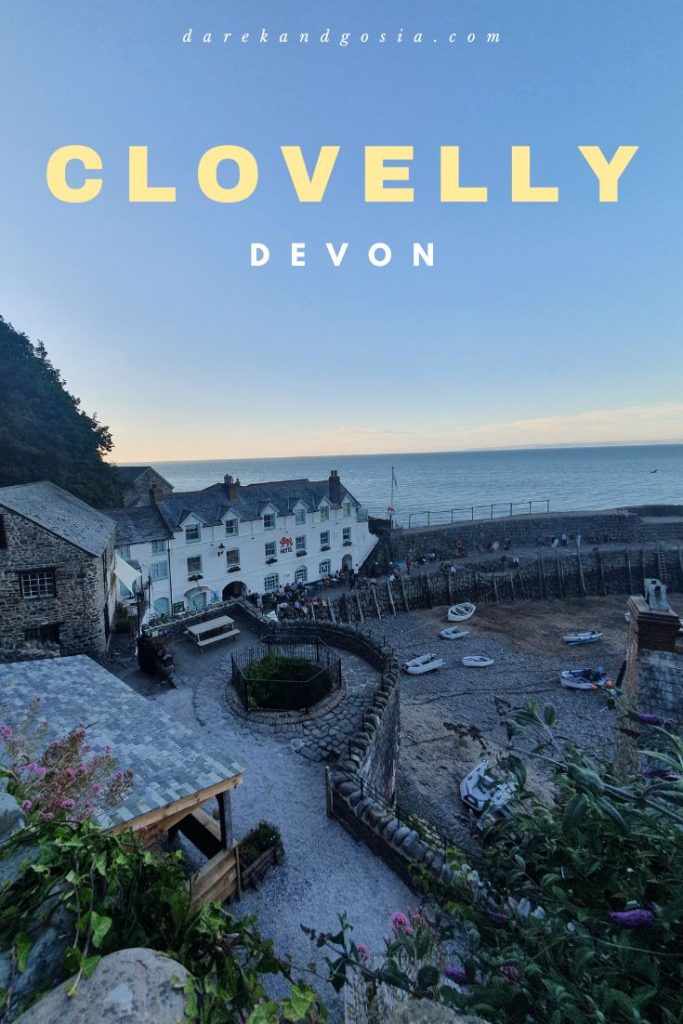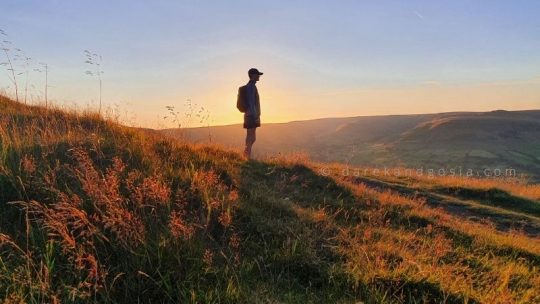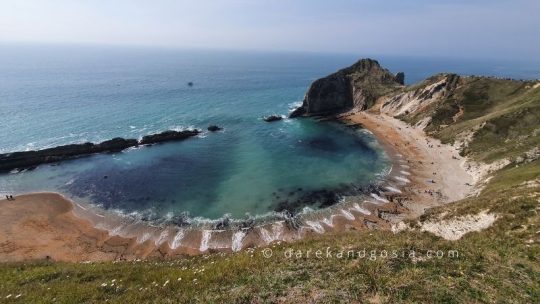Clovelly is a picturesque fishing village in North Devon, known for its steep cobbled streets, traditional buildings, and stunning coastal views.
The village is privately owned and has been preserved for many generations. It is a popular tourist destination in Devon that attracts visitors from all over the world. Without a doubt, Clovelly is one of the most beautiful villages in England!
Where in Devon is Clovelly?
Clovelly is situated in North Devon, near the border with Cornwall. It is approximately 11 miles west of Bideford, and 17 miles east of Bude. The village is situated on the coast, overlooking the Bristol Channel.
How do I get to Clovelly?
The village of Clovelly is accessible by car or bus. If you are traveling by car, there is a car park at the top of the village. From there, you can either walk down to the village or take a Land Rover service that runs throughout the day. If you prefer to take the bus, the nearest bus stop is in the nearby town of Bideford. From there, you can catch a bus to Clovelly.
Clovelly postcode
The postcode for Clovelly village is EX39 5TA.
Do you have to pay to enter Clovelly village?
Yes, there is an admission fee to enter Clovelly Village. The fee helps to maintain the historic village and its buildings. The admission fee is £8.50 for adults and £4.50 for children aged 7-16. Children under 7 are admitted for free. Family and group rates are also available. Visitors can purchase their tickets at the Visitor Centre at the top of the village, which also includes a small museum and gift shop.
Accommodation in Clovelly
There are several options for accommodation in Clovelly village, including guest houses, bed and breakfasts, and self-catering cottages. One of the most popular options is the Red Lion Hotel, which is located in the heart of the village and has stunning views of the sea. Another popular choice is the Clovelly Bay Inn, which is situated on the quay and has a bar and restaurant.
How much to rent a house in Clovelly village?
The cost of renting a house in Clovelly village varies depending on the size of the property, the season, and the length of the rental period. As most of the cottages in Clovelly are privately owned, rental rates are determined by individual property owners or their agents.
It’s worth noting that the majority of the cottages in Clovelly are listed buildings, which means that they are subject to strict regulations regarding alterations and renovations. As a result, many of the cottages have retained their traditional features and may have limited modern amenities.
For an idea of rental rates, a quick search online for holiday rentals in Clovelly shows prices ranging from around £500 to £1,500 per week, depending on the property. It’s always best to research and compare properties and rental rates to find the best deal that meets your needs and budget.
Is Clovelly good for a staycation or a weekend getaway in the UK?
Yes, Clovelly is a great destination for a staycation or a weekend getaway in the UK. The village’s traditional charm and stunning coastal setting make it a popular choice for visitors looking to escape the hustle and bustle of city life.
With a range of accommodation options and plenty of things to see and do, Clovelly is an ideal destination for anyone looking for a relaxing break in a beautiful location.
What is Clovelly famous for?
Clovelly is famous for its unique and historic cobbled streets, which are lined with traditional fishermen’s cottages.
The village has been preserved for generations, and visitors can experience what life was like in a traditional fishing village in the 19th century. The village is also known for its stunning views of the sea and its historic harbour.

Things to do in Clovelly
There are plenty of things to see and do in Clovelly village. Here are some of the highlights:
- Explore the village: The cobbled streets of Clovelly are a must-see attraction. Visitors can wander through the village, taking in the traditional fishermen’s cottages and the stunning views of the sea.
- Visit the harbour: The harbour is the heart of the village and has been used for fishing for centuries. Visitors can watch the fishermen at work and enjoy a meal or a drink at one of the restaurants or pubs.
- Walk the South West Coast Path: The South West Coast Path runs through Clovelly and offers stunning views of the coastline. Visitors can take a walk along the path, which is well-signposted and offers a range of different routes.
- Visit the Clovelly Court Gardens: The Clovelly Court Gardens are located in the grounds of Clovelly Court and offer a stunning display of flowers and plants. The gardens are open to visitors from April to October.
- Learn about the village’s history: The Clovelly Museum is located in the heart of the village and tells the story of the village’s history, from its fishing heritage to the present day.
Clovelly village history
Clovelly village has a fascinating history that dates back to the 13th century. It was originally a fishing village and became an important port in the 19th century. The village was known for its herring, mackerel, and cod fishing industry, which brought prosperity to the area.
The cobbled streets and traditional fishermen’s cottages in the village have been preserved for generations, and visitors can experience what life was like in a traditional fishing village in the 19th century. Today, Clovelly is a popular tourist destination that attracts visitors from all over the world.
Clovelly tourist information
For more information on Clovelly, visitors can check out the Clovelly Visitor Centre. The centre provides information on the village’s history, as well as advice on things to see and do in the area. Visitors can also find maps and guidebooks, as well as souvenirs and gifts.
How long is the walk down to Clovelly?
The walk down to Clovelly village can take between 10 to 20 minutes, depending on your pace and how many times you stop to take in the stunning views. The cobbled street is steep, and visitors must walk downhill, so the walk can be challenging for some.
However, the effort is well worth it, as the views of the village and the sea are breathtaking. Visitors who may find the walk difficult can also take a Land Rover ride up and down the hill for an additional fee.
Are cars allowed in Clovelly?
Cars are not allowed in the main part of Clovelly village. The village’s narrow cobbled streets and steep hills are not suitable for cars, and the local council has designated the village as a pedestrian-only zone.
Visitors can park their cars in the car park at the top of the village, which is a short walk from the main part of the village. Alternatively, visitors can also take a bus or taxi to the village. There are some service vehicles and a Land Rover that operate within the village for deliveries and transport of goods.
Who owns the cottages in Clovelly?
Most of the cottages in Clovelly are owned by the Clovelly Estate Company, which is a privately-owned company that manages the village and the surrounding land. The company has owned and managed the village since the mid-19th century when the then-owner, William Hamlyn, decided to turn Clovelly into a tourist attraction.
The company is responsible for the maintenance and upkeep of the village and its buildings, and it operates the Visitor Centre, gift shops, and other facilities in the village. Some of the cottages are also privately owned by residents who live in the village.
Places to eat in Clovelly
There are several places to eat in Clovelly village, including restaurants, pubs, and cafes. One of the most popular options is the Red Lion Hotel, which serves a range of dishes made from locally sourced ingredients.
The Harbour Bar and Restaurant is another popular choice, offering stunning views of the harbour and a range of seafood dishes. The Clovelly Bay Inn is a traditional pub that serves a range of pub grub, as well as local ales and ciders.
Pubs in Clovelly
Clovelly has several pubs that offer a range of drinks and snacks. The Clovelly Bay Inn is a traditional pub that serves a range of local ales and ciders, as well as pub grub. The Red Lion Hotel also has a bar, which offers a range of drinks and snacks.
Clovelly shops
There are several shops in Clovelly village that sell souvenirs, gifts, and local produce. The Clovelly Village Stores sell a range of groceries, as well as gifts and souvenirs. The Fisherman’s Cottage Gift Shop is another popular choice, offering a range of nautical-themed gifts and souvenirs.
Restaurants in Clovelly
Clovelly has several restaurants that offer a range of dishes made from locally sourced ingredients. The Red Lion Hotel is a popular choice, offering a range of British and European dishes. The Harbour Bar and Restaurant is another popular choice, offering stunning views of the harbour and a range of seafood dishes.
Clovelly coffee shops
There are several coffee shops in Clovelly village that offer a range of hot drinks and snacks. The Clovelly Coffee Shop is a popular choice, offering a range of coffee, tea, and cakes.
What attracts visitors to Clovelly?
Clovelly is known for its historic charm, stunning views of the sea, and unique cobbled streets. Visitors come to the village to experience what life was like in a traditional fishing village in the 19th century.
The village’s historic harbour is also a popular attraction, where visitors can watch the fishermen at work and enjoy a meal or a drink at one of the restaurants or pubs.
What famous film was filmed in Clovelly?
The village of Clovelly was used as a filming location for the 1998 film “The Shell Seekers,” which was based on the novel of the same name by Rosamunde Pilcher.
What to do in Clovelly in the rain?
If it’s raining in Clovelly, there are still plenty of things to see and do. Visitors can explore the village’s historic cobbled streets and traditional fishermen’s cottages, which are covered by a canopy of trees.
The Clovelly Museum is also a popular attraction, offering a fascinating insight into the village’s history. Additionally, visitors can take a stroll along the South West Coast Path, which offers stunning views of the sea and coastline.
Which is better Clovelly or Port Isaac?
Clovelly and Port Isaac are both beautiful English villages located in the southwest of England. While both offer stunning views of the sea and charming historic buildings, they have different atmospheres.
Clovelly is known for its cobbled streets and traditional fishing village feel, while Port Isaac is known for its narrow streets and picturesque harbour. Ultimately, which is better depends on personal preference.
Day trips from Clovelly
There are several day trips that visitors to Clovelly can take. The nearby town of Bideford is a popular destination, with its historic bridge and quayside. The coastal town of Ilfracombe is also worth a visit, with its stunning coastal scenery and interesting museums. The town of Barnstaple, which is located on the River Taw, is another popular destination.
Free things to do in Clovelly
There are several free things to do in Clovelly, including:
- Walking along the South West Coast Path
- Exploring the village’s cobbled streets and traditional fishermen’s cottages
- Visiting the Clovelly Museum
- Taking in the views of the sea and coastline
How do I spend a day in Clovelly?
Visitors can spend a day in Clovelly exploring the village’s historic streets and buildings, taking in the views of the sea and coastline, and visiting the local shops, restaurants, and pubs.
A visit to the Clovelly Museum is also recommended, as it offers a fascinating insight into the village’s history. Additionally, visitors can take a stroll along the South West Coast Path, which offers stunning views of the sea and coastline.
Best places near Clovelly to visit
There are several great places to visit near Clovelly, including:
- Bideford: a historic town with a picturesque quayside
- Ilfracombe: a coastal town with stunning scenery and interesting museums
- Hartland: a village with a beautiful abbey and coastal walks
- Westward Ho!: a seaside village with a long sandy beach and a golf course
- Woolacombe: a popular seaside resort with a beautiful beach
- Appledore: a charming village with narrow streets and colourful houses
- Saunton Sands: a popular beach with great surf conditions
- Lynton and Lynmouth: twin villages with beautiful scenery and interesting history
- Exmoor National Park: a beautiful national park with plenty of hiking trails and wildlife
- The Tarka Trail: a popular cycling and walking route that runs through beautiful countryside and along the River Taw
Is Clovelly worth visiting?
Yes! Clovelly is definitely worth visiting, particularly for those who are interested in history and traditional fishing villages. The village’s cobbled streets and traditional fishermen’s cottages are well-preserved and offer a unique insight into life in a traditional fishing village in the 19th century.
Additionally, the stunning views of the sea and coastline, as well as the local shops, restaurants, and pubs, make it a great destination for a day trip or longer stay.

